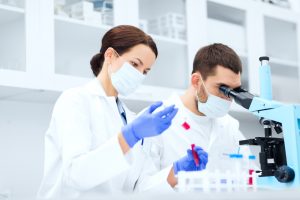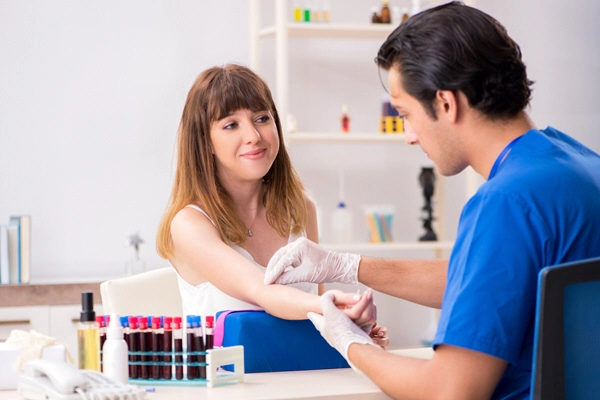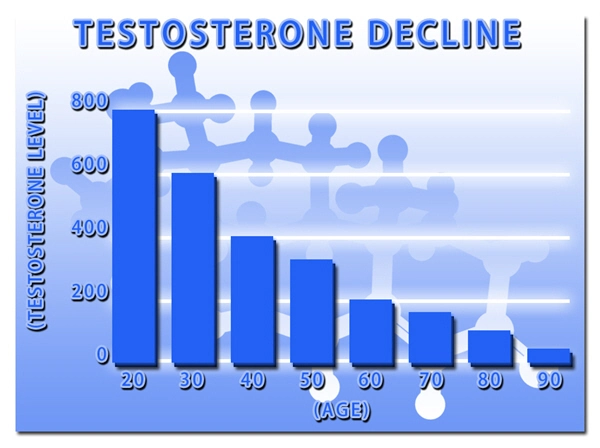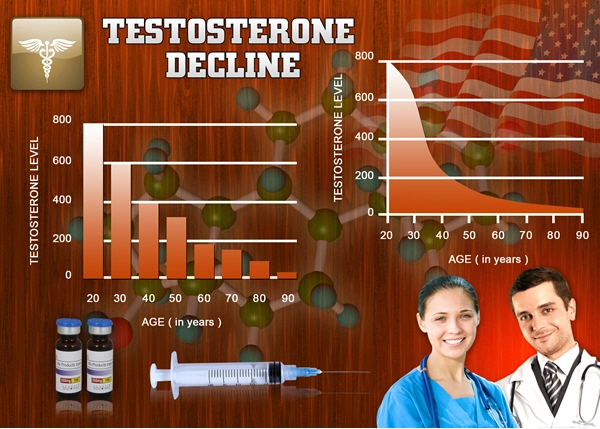While “male menopause” – or worse, “manopause” – is often used in discussions, it isn’t a correct diagnosis. The British National Health Service (NHS) website calls it “misleading”. As the US Mayo Clinic explains, “Aging-related hormone changes in women and men are different. In women, ovulation ends and hormone production plummets during a relatively short period of time. This is  known as menopause. In men, production of testosterone and other hormones declines over a period of many years and the consequences aren’t necessarily clear.”
known as menopause. In men, production of testosterone and other hormones declines over a period of many years and the consequences aren’t necessarily clear.”
“Manopause” or not, it has finally become accepted by medical professionals that the loss of testosterone can have significant adverse effects on the health of middle-aged and older men.
Numerous studies have found that beginning around age 30 men see their testosterone levels ebb at a rate of approximately 10% per decade. Do the math. By age 80, a man has half the testosterone than when he was in his prime...and the results are not pretty.
The loss of testosterone wreaks even more havoc in overweight men and those with diabetes.
Sadly, for decades physicians were reluctant to prescribe Testosterone Replacement Therapy (TRT) to men suffering from low testosterone levels (“Low-T”) due to concerns over prostate and cardiovascular issues.
Fortunately times have changed, and many physicians now agree that men can benefit from TRT. Here is an example of what TRT did for a typical, average middle-aged man.
At age of 42, Jeremy Kareken was chronically tired, overweight and depressed...a pathetic sad sack. “It took more of an effort to get out of bed and do the things I enjoyed,” says the playwright and actor, who lives between London and New York. “I was too tired to exercise, and when I did, the gains were much smaller; the gym was harder work. I had no sex drive. My two children, then aged six and three, were growing up, so I knew that wasn’t what was tiring me out. I was worried I was on a slow slide to the grave, with diminishing pleasure in my life.”
Kareken, now 53, was swallowing antidepressants: his doctor tried a new drug that had nasty side effects, so he stopped taking it. “My GP joked that my problem must be the menopause, he thought he should probably test my blood,” says Kareken. “It turned out, as well as having a vitamin D deficiency, I was particularly low in testosterone. So I was started on a program of daily testosterone gel supplementation.”
TRT has become a hot topic, with the publication of a new study in a leading medical journal, conducted in 11 countries, including the UK, the US and Australia. Heading up the study is Dr Channa Jayasena, a consultant in reproductive endocrinology at Imperial College, London.
“In the old days, testosterone was only prescribed for men with rare problems following cancer treatments or a condition called hypogonadism,” says Dr Jayasena. (Hypogonadism is a state of low testosterone, either inherited or caused by an injury or infection.) “More recently, hormone supplementation has become available to a wider variety of men, particularly in middle age,” he says. “The question now is: should you give TRT to these men?”
“We don’t really know why a loss of testosterone happens,” says Dr Clive Morrison, a GP specializing in reproductive health in people with diabetes. He added that “It could be genetic, it could be triggered by high stress. But what isn’t in doubt are the symptoms: low mood, brain fog, weight gain and erectile dysfunction,” he adds.
Morrison says his patients are referred by personal trainers who have seen a drop in performance, or more often, their wives and girlfriends. “One man told me his wife was accusing him of having an  affair. He told me that was the last thing on his mind,” says Dr Morrison.
affair. He told me that was the last thing on his mind,” says Dr Morrison.
Kareken discovered that similar to women experiencing menopause, men battling depression in midlife are often treated with antidepressants; TRT is usually not the first thing considered by some doctors, but, again, that is changing. “When a man in his 40s or 50s comes to see me, I ask about his general mood and concentration, as well as questions about erectile dysfunction,” says Dr Morrison.
“But Viagra won’t work in 50 per cent of men who have low testosterone. On the other hand, if a man of a certain age goes to his GP complaining of low self-esteem, he’ll get packed off to his ‘man shed’. We need to be looking at the whole package of symptoms – and the best way to get to the bottom of it is through a blood test, which also rules out conditions such as anaemia or thyroid problems.”
Clinicians use a testosterone “score” to determine whether a man needs TRT. “Unlike a condition such as diabetes, there’s no widely agreed cut-off for whether testosterone is low or not,” says Dr Jayasena. “But in general, a level of above 12 is likely to be normal, and below eight is likely to be abnormal.”
Then, suppose results suggest the patient might benefit from testosterone supplementation. In that case, the man is either given a gel to rub into his upper arms or shoulders or an injection lasting three months. As with HRT, there can be trial and error to get the dose right, and it can take several weeks to see the benefits.
At first, Kareken – who scored 7.69 – did not see any of the promised benefits of TRT. He discussed this with his doctor, who increased the dose of gel. After three months, he began to experience significant positive changes in his mood and energy, especially in the gym.
“When the doctor first suggested I should supplement with testosterone, I wasn’t actually surprised,” he says. “In the States, where I’m from, it’s advertised all over the place on TV, where commercials demand: ‘Do you have low T?’ I was relieved there appeared to be a simple answer to what had been making me so miserable. And no, I wasn’t embarrassed. If you had a broken arm, you wouldn’t be embarrassed to wear a cast, would you?”
Kareken was elated to see the pounds dropping, the fat evaporating, the muscles reappearing, and his good moods returning. “I normally get SAD (seasonal affective disorder, a kind of depression) in the winter, but while on TRT, it diminishes,” he says. “Plus, people think testosterone might make you more aggressive, but I actually felt calmer in disagreements. And my sex drive went up considerably.”
He experienced no significant side effects. “The hair on the top of my head and my beard may have thinned slightly – this is a known possible side effect – but this might have been happening with age anyway,” he says. “I also had to make sure I continued my yearly blood tests because of the slight risk of blood clots.”
Formerly, researchers were concerned that TRT increased the risk of thrombosis or blood clots.  However, a significant study of 5,000 men (followed for two years) was published in the New England Journal of Medicine and concluded that the risk of “major adverse cardiac events” was not elevated by TRT.
However, a significant study of 5,000 men (followed for two years) was published in the New England Journal of Medicine and concluded that the risk of “major adverse cardiac events” was not elevated by TRT.
“The research was reassuring,” says Dr. Jayasena. “It showed that, if used appropriately, testosterone is not in the medium term associated with heart attacks and strokes. But the big question still is: should we be giving it at all?”
The ideal scenario is for older men to undergo TRT as a vehicle to get to where they don’t need it as much. This is precisely what happened to Kareken. Last year, nine years after starting to use TRT, he began to taper off.
“Since I lost weight and started exercising more, my testosterone levels went up naturally and stabilized,” he says. “I now only use the gel once every other day. At 53, I’m in better shape than I’ve ever been.” He no longer needs to take antidepressants, either.
“I’m not saying that every man should use testosterone,” Kareken says. “However, I do feel that every man should have the opportunity to see a doctor to have his testosterone levels checked. TRT has changed my life for the better in every possible way.”

- Human Growth Hormone Injections In Cheyenne [Last Updated On: February 7th, 2024] [Originally Added On: October 19th, 2018]
- Human Growth Hormone Injections In Madison [Last Updated On: February 7th, 2024] [Originally Added On: October 19th, 2018]
- Human Growth Hormone Injections In Vancouver [Last Updated On: February 7th, 2024] [Originally Added On: October 19th, 2018]
- Human Growth Hormone Injections In Tacoma [Last Updated On: February 7th, 2024] [Originally Added On: October 19th, 2018]
- Human Growth Hormone Injections In Spokane [Last Updated On: February 7th, 2024] [Originally Added On: October 19th, 2018]
- Human Growth Hormone Injections In Bellevue [Last Updated On: February 7th, 2024] [Originally Added On: October 19th, 2018]
- Human Growth Hormone Injections In Richmond [Last Updated On: February 7th, 2024] [Originally Added On: October 19th, 2018]
- Human Growth Hormone Injections In Portsmouth [Last Updated On: February 7th, 2024] [Originally Added On: October 19th, 2018]
- Human Growth Hormone Injections In Norfolk [Last Updated On: February 7th, 2024] [Originally Added On: October 19th, 2018]
- Human Growth Hormone Injections In Hampton [Last Updated On: February 7th, 2024] [Originally Added On: October 19th, 2018]
- Human Growth Hormone Injections In Chesapeake [Last Updated On: February 7th, 2024] [Originally Added On: October 19th, 2018]
- Human Growth Hormone Injections In Alexandria [Last Updated On: February 7th, 2024] [Originally Added On: October 19th, 2018]
- Human Growth Hormone Injections In Montpelier [Last Updated On: February 7th, 2024] [Originally Added On: October 19th, 2018]
- Human Growth Hormone Injections In Provo [Last Updated On: February 7th, 2024] [Originally Added On: October 19th, 2018]
- Human Growth Hormone Injections In Waco [Last Updated On: February 7th, 2024] [Originally Added On: October 19th, 2018]
- Human Growth Hormone Injections In Richardson [Last Updated On: February 7th, 2024] [Originally Added On: October 19th, 2018]
- Human Growth Hormone Injections In Plano [Last Updated On: February 7th, 2024] [Originally Added On: October 19th, 2018]
- Human Growth Hormone Injections In Pasadena [Last Updated On: February 7th, 2024] [Originally Added On: October 19th, 2018]
- Human Growth Hormone Injections In Midland [Last Updated On: February 7th, 2024] [Originally Added On: October 19th, 2018]
- Human Growth Hormone Injections In Mesquite [Last Updated On: February 7th, 2024] [Originally Added On: October 19th, 2018]
- Human Growth Hormone Injections In McKinney [Last Updated On: February 7th, 2024] [Originally Added On: October 19th, 2018]
- Human Growth Hormone Injections In McAllen [Last Updated On: February 7th, 2024] [Originally Added On: October 19th, 2018]
- Human Growth Hormone Injections In Lubbock [Last Updated On: February 7th, 2024] [Originally Added On: October 19th, 2018]
- Human Growth Hormone Injections In Lewisville [Last Updated On: February 7th, 2024] [Originally Added On: October 20th, 2018]
- Human Growth Hormone Injections In Laredo [Last Updated On: February 7th, 2024] [Originally Added On: October 20th, 2018]
- Human Growth Hormone Injections In Killeen [Last Updated On: February 7th, 2024] [Originally Added On: October 20th, 2018]
- Human Growth Hormone Injections In Irving [Last Updated On: February 7th, 2024] [Originally Added On: October 20th, 2018]
- Human Growth Hormone Injections In Garland [Last Updated On: February 7th, 2024] [Originally Added On: October 20th, 2018]
- Human Growth Hormone Injections In Denton [Last Updated On: February 7th, 2024] [Originally Added On: October 20th, 2018]
- Human Growth Hormone Injections In Carrollton [Last Updated On: February 7th, 2024] [Originally Added On: October 20th, 2018]
- Human Growth Hormone Injections In Brownsville [Last Updated On: February 7th, 2024] [Originally Added On: October 20th, 2018]
- Human Growth Hormone Injections In Beaumont [Last Updated On: February 7th, 2024] [Originally Added On: October 20th, 2018]
- Human Growth Hormone Injections In Austin [Last Updated On: February 7th, 2024] [Originally Added On: October 20th, 2018]
- Human Growth Hormone Injections In Arlington [Last Updated On: February 7th, 2024] [Originally Added On: October 20th, 2018]
- Human Growth Hormone Injections In Amarillo [Last Updated On: February 7th, 2024] [Originally Added On: October 20th, 2018]
- Human Growth Hormone Injections In Abilene [Last Updated On: February 7th, 2024] [Originally Added On: October 20th, 2018]
- Human Growth Hormone Injections In Nashville [Last Updated On: February 7th, 2024] [Originally Added On: October 20th, 2018]
- Human Growth Hormone Injections In Murfreesboro [Last Updated On: February 7th, 2024] [Originally Added On: October 20th, 2018]
- Human Growth Hormone Injections In Memphis [Last Updated On: February 7th, 2024] [Originally Added On: October 20th, 2018]
- Human Growth Hormone Injections In Knoxville [Last Updated On: February 7th, 2024] [Originally Added On: October 20th, 2018]
- Human Growth Hormone Injections In Clarksville [Last Updated On: February 7th, 2024] [Originally Added On: October 20th, 2018]
- Human Growth Hormone Injections In Chattanooga [Last Updated On: February 7th, 2024] [Originally Added On: October 20th, 2018]
- Human Growth Hormone Injections In Erie [Last Updated On: February 7th, 2024] [Originally Added On: October 20th, 2018]
- Human Growth Hormone Injections In Allentown [Last Updated On: February 7th, 2024] [Originally Added On: October 20th, 2018]
- Human Growth Hormone Injections In Salem [Last Updated On: February 7th, 2024] [Originally Added On: October 20th, 2018]
- Human Growth Hormone Injections In Portland [Last Updated On: February 7th, 2024] [Originally Added On: October 20th, 2018]
- Human Growth Hormone Injections In Gresham [Last Updated On: February 7th, 2024] [Originally Added On: October 20th, 2018]
- Human Growth Hormone Injections In Eugene [Last Updated On: February 7th, 2024] [Originally Added On: October 20th, 2018]
- Human Growth Hormone Injections In Tulsa [Last Updated On: February 7th, 2024] [Originally Added On: October 20th, 2018]
- Human Growth Hormone Injections In Norman [Last Updated On: February 7th, 2024] [Originally Added On: October 20th, 2018]
- Human Growth Hormone Injections In Toledo [Last Updated On: February 7th, 2024] [Originally Added On: October 20th, 2018]
- Human Growth Hormone Injections In Dayton [Last Updated On: February 7th, 2024] [Originally Added On: October 20th, 2018]
- Human Growth Hormone Injections In Columbus [Last Updated On: February 7th, 2024] [Originally Added On: October 20th, 2018]
- Human Growth Hormone Injections In Akron [Last Updated On: February 7th, 2024] [Originally Added On: October 20th, 2018]
- Human Growth Hormone Injections In Paterson [Last Updated On: February 7th, 2024] [Originally Added On: October 20th, 2018]
- Human Growth Hormone Injections In Reno [Last Updated On: February 7th, 2024] [Originally Added On: October 20th, 2018]
- Human Growth Hormone Injections In Henderson [Last Updated On: February 7th, 2024] [Originally Added On: October 20th, 2018]
- Human Growth Hormone Injections In Omaha [Last Updated On: February 7th, 2024] [Originally Added On: October 20th, 2018]
- Human Growth Hormone Injections In Lincoln [Last Updated On: February 7th, 2024] [Originally Added On: October 20th, 2018]
- Human Growth Hormone Injections In Billings [Last Updated On: February 7th, 2024] [Originally Added On: October 20th, 2018]
- Human Growth Hormone Injections In Springfield [Last Updated On: February 7th, 2024] [Originally Added On: October 20th, 2018]
- Human Growth Hormone Injections In Independence [Last Updated On: February 7th, 2024] [Originally Added On: October 20th, 2018]
- Human Growth Hormone Injections In Columbia [Last Updated On: February 7th, 2024] [Originally Added On: October 20th, 2018]
- Human Growth Hormone Injections In Jackson [Last Updated On: February 7th, 2024] [Originally Added On: October 20th, 2018]
- Human Growth Hormone Injections In Rochester [Last Updated On: February 7th, 2024] [Originally Added On: October 20th, 2018]
- Human Growth Hormone Injections In Warren [Last Updated On: February 7th, 2024] [Originally Added On: October 20th, 2018]
- Human Growth Hormone Injections In Lansing [Last Updated On: February 7th, 2024] [Originally Added On: October 20th, 2018]
- Human Growth Hormone Injections In Flint [Last Updated On: February 7th, 2024] [Originally Added On: October 20th, 2018]
- Human Growth Hormone Injections In Worcester [Last Updated On: February 7th, 2024] [Originally Added On: October 20th, 2018]
- Human Growth Hormone Injections In Springfield [Last Updated On: February 7th, 2024] [Originally Added On: October 20th, 2018]
- Human Growth Hormone Injections In Lowell [Last Updated On: February 7th, 2024] [Originally Added On: October 20th, 2018]
- Human Growth Hormone Injections In Cambridge [Last Updated On: February 7th, 2024] [Originally Added On: October 20th, 2018]
- Human Growth Hormone Injections In Augusta [Last Updated On: February 7th, 2024] [Originally Added On: October 20th, 2018]
- Human Growth Hormone Injections In Shreveport [Last Updated On: February 7th, 2024] [Originally Added On: October 20th, 2018]
- Human Growth Hormone Injections In Lafayette [Last Updated On: February 7th, 2024] [Originally Added On: October 20th, 2018]
- Human Growth Hormone Injections In Louisville [Last Updated On: February 7th, 2024] [Originally Added On: October 20th, 2018]
- Human Growth Hormone Injections In Lexington [Last Updated On: February 7th, 2024] [Originally Added On: October 20th, 2018]
- Human Growth Hormone Injections In Wichita [Last Updated On: February 7th, 2024] [Originally Added On: October 20th, 2018]
- Human Growth Hormone Injections In Topeka [Last Updated On: February 7th, 2024] [Originally Added On: October 20th, 2018]
- Human Growth Hormone Injections In Olathe [Last Updated On: February 7th, 2024] [Originally Added On: October 20th, 2018]



List of USA state clinics - click a flag below for blood testing clinics.
Word Count: 1379



















































